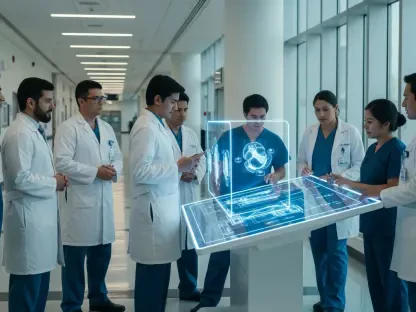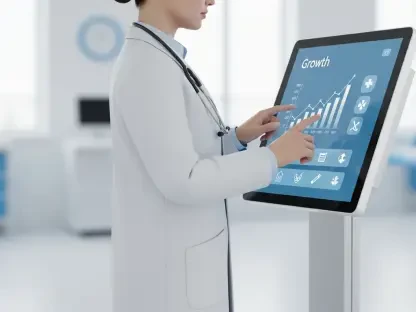I’m thrilled to sit down with Faisal Zain, a trailblazer in healthcare innovation with a deep background in medical technology. With years of experience in the manufacturing of medical devices for diagnostics and treatment, Faisal has been at the forefront of transforming healthcare delivery through cutting-edge solutions. In this conversation, we dive into the evolving landscape of healthcare in Saudi Arabia, exploring how integrated ecosystems, digital tools, and patient-centered approaches are shaping the future. We’ll also touch on the role of strategic partnerships and the alignment with national goals like Vision 2030, as Faisal shares insights from his extensive expertise.
How do you see the mission of advancing healthcare in Saudi Arabia aligning with broader national objectives?
I believe the mission to advance healthcare in Saudi Arabia is deeply intertwined with the ambitious goals of Vision 2030. It’s about creating a system that prioritizes accessibility, sustainability, and quality of life for every individual. From my perspective in medical technology, this means leveraging innovation to build solutions that not only treat illness but also prevent it, ensuring healthcare becomes a proactive rather than reactive force. This aligns with the national push to transform the health sector into a more efficient and human-centered model, where technology and care work hand in hand to elevate outcomes across the Kingdom.
What does a connected healthcare ecosystem mean to you, and why is it so critical today?
A connected healthcare ecosystem, in my view, is about breaking down silos between different aspects of care—whether it’s consultations, diagnostics, or follow-up. It’s creating a seamless journey for patients where every touchpoint, from a virtual visit to a home-based test, is linked through digital platforms. This is critical today because patients expect convenience and speed without sacrificing quality. With the integration of digital tools, we can ensure that a patient’s data flows effortlessly between providers, reducing delays and improving decision-making. It’s a game-changer for both accessibility and efficiency.
Can you share your thoughts on the impact of digital innovation, like virtual clinics, on patient care?
Digital innovation, especially through virtual clinics, has revolutionized how we deliver care. These platforms allow patients to connect with physicians anytime, anywhere, which is a lifeline for those in remote areas or with busy schedules. From my work in medical tech, I’ve seen how instant consultations and digital prescriptions cut down on unnecessary hospital visits, saving time and resources. The feedback I’ve observed often highlights relief—patients feel empowered knowing help is just a click away. It’s not just about numbers; it’s about making healthcare feel more personal and responsive.
How do you think home-based healthcare services are changing the way patients experience medical care?
Home-based healthcare is reshaping the patient experience by bringing care directly to where people feel most comfortable. Services like lab tests, vaccinations, or even medication delivery at home eliminate the stress of travel and long waits at facilities. In my view, this model is especially vital for the elderly or those managing chronic conditions, as it ensures continuity without disruption. When you cover vast areas like multiple cities, as we’re seeing in Saudi Arabia, it sets a new standard for reach compared to traditional providers, making care truly inclusive.
What’s the value of bringing healthcare services directly into workplaces for both employees and employers?
Bringing healthcare into workplaces is a brilliant move because it addresses wellness right where people spend most of their day. For employees, having access to on-site clinics for general checkups, physiotherapy, or even health programs means less time off and more focus on well-being. Employers benefit too—it boosts productivity and shows a commitment to staff health, fostering loyalty. From a tech perspective, I see this as an opportunity to integrate wearable devices or health tracking tools into these setups, creating a data-driven approach to corporate wellness that aligns with broader quality-of-life goals.
In what ways can healthcare providers support the shift from reactive treatment to proactive prevention?
Supporting the shift to proactive prevention requires a mindset change, and technology plays a huge role here. Providers can use data analytics and AI to predict health risks before they become serious issues—think identifying early signs of diabetes or heart disease through patterns in patient data. In my field, we’ve developed devices that monitor vital signs in real time, alerting both patients and doctors to anomalies. This, combined with digital platforms for regular check-ins, moves us away from just treating symptoms to stopping problems before they start, which is exactly what national health transformation programs are aiming for.
How important are strategic partnerships in expanding healthcare access across a country like Saudi Arabia?
Strategic partnerships are absolutely essential for expanding healthcare access in a country as vast and dynamic as Saudi Arabia. Collaborating with government bodies, private organizations, and even financial institutions allows for shared resources, broader networks, and innovative funding models. From my experience, these alliances help scale solutions—whether it’s setting up clinics in new regions or integrating tech into existing systems. They also build trust with communities, ensuring that the healthcare we deliver is culturally relevant and widely accepted, which is key to long-term impact.
What can you tell us about the role of data and AI in improving health outcomes for patients?
Data and AI are transforming health outcomes by personalizing care in ways we couldn’t imagine a decade ago. AI can analyze massive amounts of patient data to spot trends, predict conditions, and suggest tailored treatment plans. In my work with medical devices, I’ve seen how AI-powered diagnostics reduce errors and speed up results, which is critical for conditions like cancer or heart disease. For patients, this means faster, more accurate care, and for providers, it’s about optimizing resources. The real magic happens when this tech is paired with human compassion—it’s a powerful combo for better health.
What is your forecast for the future of healthcare innovation in Saudi Arabia?
I’m incredibly optimistic about the future of healthcare innovation in Saudi Arabia. With Vision 2030 as a guiding force, I foresee a rapid expansion of digital-first models, where telemedicine and AI-driven care become the norm rather than the exception. We’ll likely see more investment in home healthcare and wearable tech, making monitoring and prevention second nature. The growth of physical and virtual clinic networks will bridge gaps in access, especially in underserved areas. Ultimately, I believe we’re heading toward a system where every patient feels seen and supported, no matter where they are, thanks to a blend of technology and genuine human care.









